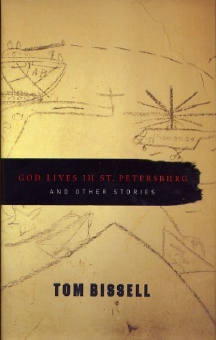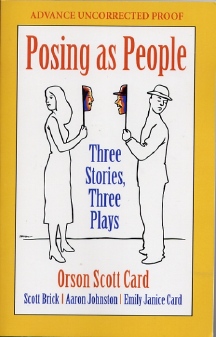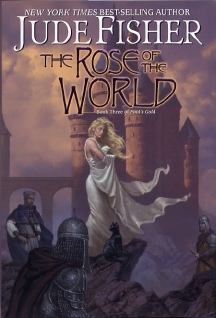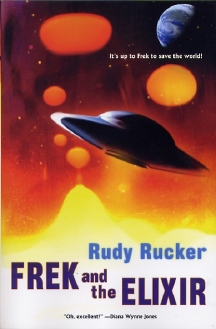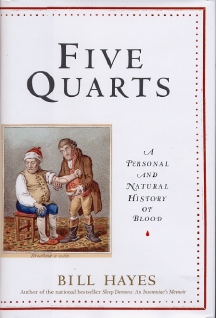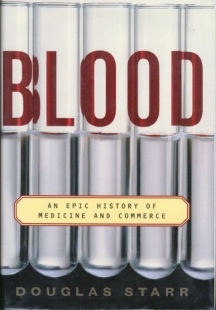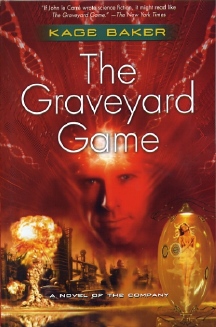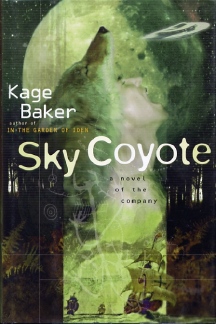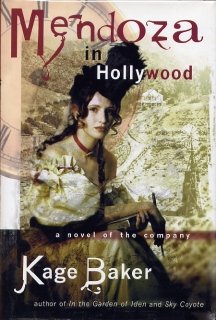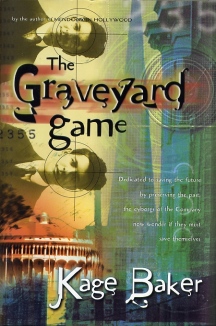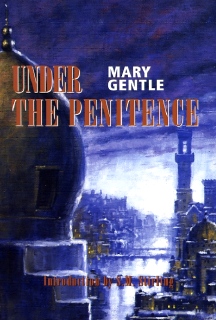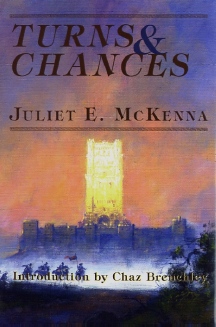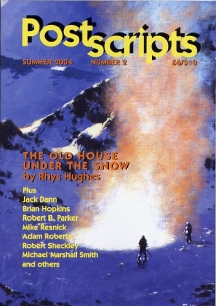|
|
|
This Just In...News from the Agony Column
|
01-28-05: See You in Glasgow; Tom Bissell Knows that 'God Lives in St. Petersburg' |
||||||
Worldcon
2005, Bring Your Own Dog-Shocker
Well, my wife and I pressed the "SUBMIT" button for the airline tickets yesterday, so that's that: we're going to Glasgow, to attend InterAction, Worldcon 2005. I look forward to seeing a few readers there, a few writers there and setting foot on the cursed and blessed island on which so much of the literature I love has been written. I have to admit that I thought it would be harder to do at this late date than it turned out to be. The WorldCon committee has a well-run website that we both found very helpful. So far that is. We'll see how fast we have to run between panels when we're there. Our plan is to first attend the convention, then spend the remainder of our time in London. We've never been, as is said in travel circles, and we're really looking forward to it. I've written extensively on how much fun conventions are as a means of stimulating travel, and this looks to be a real treat. I've already been told I'll have to ship the books I buy home separately. Well, that's OK. One of the most entertaining aspects of the convention -- at least until you're there -- is voting for the Hugos. I've actually read a fair number of Hugo-worthy works this year, so it may not be too much of a stretch for me to be able to make an informed vote. Furthermore, with all the magazine reading I've done I may have read some of the short fiction as well. Much of it was outstanding and I look forward to seeing what gets on the ballot and then making the decision as to what to read that I've not already read. Unfortunately, I'll have to wait until I get my packet to actually vote -- online, which is how I intend to vote. But be assured I'll have some spewage as to what I'm voting for and why, for those readers who enjoy a good dive into the muck that is my mind. Right now, I've got a little email folder with all of four messages in it, confirming my credit card transaction, my hotel reservations, and the thanks for completing the questionnaire email. That questionnaire, by the way, is the one for people who volunteer to help by moderating panels. Now, I'm not well known as a moderate person, but I'll be happy to offer the pretense of moderation should actually moderate people be in short supply. I told them I was interested in "Lit" (as in literature) and Media. I'm not even sure what media means, I think it means movies, though I thought it might mean websites, etc. So, having done my time on a website, I figured I might be able to, if nothing else, talk about what not to do. I did cop to being interested in YA fiction -- I do have two teenagers -- but in general, I'd have to say that most YA's experience genre fiction via video games. All I know about those is how much they cost (a lot) and how much they make (a whole hell of a lot). And here's what else I copped to being interested in, followed by some small comments as to why... Literary aspects of genre fiction -- Big surprise there! Trends and subgenres -- Again, an opportunity to rant. Authors -- Well, aren't we all interested in authors? And I have talked to a few. Online reviewing and fiction, online presences -- Since again I can provide a template of what to avoid. Computer related fiction -- security, IT -- I spent many years in the biz and have some opinions on this as a result. Suburban SF -- Nobody has done really any suburban SF, except a few PKD novels. But they should. I read all about cyborgs and fighting aliens and such-like, but I still wonder what the dweebs back in the burbs are doing. Horror in SF -- Did I mention monsters here -- I swear I did! Publishing -- Well, that is how all this stuff gets our attention, innit? Editing -- Since I'm in theory an editor, I can offer theories about editing! Marketing SF -- I speculate a lot on this, and I recently told an editor I felt like Percival Lowell, mapping the canals of Mars. So let's see if those are canals or just old riverbeds. Areas to Avoid: Gaming -- Don't know nothing about it -- or want to. RPG -- Ditto. Fandom -- And same. These are areas about which I remain cheerfully and willfully ignorant, and I prefer in these cases not to put my ignorance on display. Notable Information: Literary insights, IT experience, reviewing and commentary experience. OK, I guess I'm perhaps kitting myself up a bit to suggest that I might provide literary insights, but I can recognize them when they hit me upside the head. I do have actual, real-world, hands-on IT experience, and that might be of use in some panel on IT-based fiction, should such an unlikely subject arise. And finally I will state that I feel fully competent to comment on writing reviews and commentaries on speculative fiction. OtherInfo: See the website -- http://trashotron.com/agony to get an idea of 'what I'm on about'. I'd like to host a panel on derivative fiction, on monsters in fiction, on IT-oriented fiction, on fiction set in the suburbs. To name a few. A panel on space opera -- Hamilton, Reynolds, Williams. Horror in SF. I have much experience interviewing authors. I'm interested in publishing, editing and marketing SF and have written much commentary on these matters. So the above is what I put in, and there are the monsters! Good, thought I'd forgotten about 'em. And notice I didn't claim to have written informed commentary. Oh well. I can't imagine that they'll need my help, the panels seemed well staffed at Torcon, but, this might add a veneer of frantic madness to my already frantic trip to the UK. Please, if you see me there, stop me before I spend again. I'm going to request one of those doggie electric shock thingies be set up around the dealer's room. I suspect they'd be pretty popular. "No, Daddy, no! Don't go there!" But we are going -- and you'll see me there, perhaps with a dog-shocker attached. |
||||||
Pushcart
Prize-Winning, Published in Harper's and The Believer,
This Guy Leads a Hard-Workin' but Charmed Life
I'm sorry, I had to leave the room and weep for while. I'm all better now. So here's a guy who's pushing thirty and dancing about on credits that writers who have been hacking away for thirty or more years would kill for. Pantheon is sending his Harper's article along with the book, as the Harper's article is the basis for his next book. And here I am, feeling good about actually having that issue of Harper's, somewhere in the stacks. Well, we all contribute in our own way. Interestingly enough, Tom Franklin, author of one of Terry D'Auray's top-ten books, 'Hell at the Breach' provides a back cover blurb for Bissell. No, it's OK, I've got a tissue. Sniff. So with all these qualifications, the real hell of it is that the book itself is not superfluous. It looks really good, and it's only 200 pages, nicely short, and it's only $20 bucks. You can't even take the other half to a movie for that price these days. And the six stories within will provide so much more entertainment for both you and the wife -- provided that whole charmed life aspect doesn't bum you out too much -- that it's a snap, you should pick this up. And when your "more literary than thou" friends come over, you can actually have read a story or two, wave it in their face, and turn the conversation back to your new habit of running every morning.
In 'Aral', a female scientist investigating the Aral Sea disaster --see, look, I didn't even know there had been a disaster in the Aral Sea! -- is trapped by a KGB officer. Sure a potential for humor there, but I'm putting my money on tragedy. And the old marriage-unraveling story shows up in 'Expensive Trips Nowhere'. As much as I can't see that sort of thing as funny, I'm going to take a chance and call this one of the funny stories. It's about time, isnt it? And certainly, when 'The Ambassador's Son' gets in over his head, that's got to be funny, hasnt it? The title story won a Pushcart Prize (Straw/Camel/Back) and as it's about a priest who has to cope with his sexual urges, I've got to place it firmly in the tragedy side. But just to make sure the whole collection balances out, 'Animals in Our Lives' finds a young man returning from Kyrgyzstan to discover his relationship with his fiancée has taken a nose-dive. Laugh at the poor clown. Laugh I say! And when you're done, nominate the guy for a Hugo, I mean, clearly, he needs one. Me, I'll be off at Costco, buying a crate of aloe vera scented Kleenex. |
|
01-27-05: 'Posing As People' With Orson Scott Card; Jude Fisher's Fools Gold Part 3, 'The Rose of the World |
|||
Three
Stories, Three Plays, 4 CDs
Of course, while Sub Press is doing the publishing honors, there's a huge variety of talent on display here. Orson Scott Card wrote the stories and originally conceived of them as being potentially adaptable into a play. Each of three stories is adapted by a different playwright. And each play is produced with a full cast, sound effects and a professional quality studio recording; that is, the plays are produced specifically for the CDs not simple single-microphone-in-a-rehearsal recordings. It's not very often that the credits to a publication include such a large cast, but here's to hoping this does happen again. It's an impressive, complex production. It's packaged as a book plus CDs with a forward to the whole shebang by Card, then the full text of the three plays, each with a forward or afterward by the playwright. The book also contains the full text of the three stories, each with an afterward by Card. Not only is that a lot of writing, it's also a lot of writing about writing, a lot of insight into the process of creation and adaptation, from beginning to end, that you don't often find in genre fiction. The original production opened on September 10 of last year in the Whitefire Theater in LA. The three stories adapted here include "Clap Hands and Sing", adapted by Scott Brick. Beginning in a blitz of comedic, satiric media sampling, we're introduced to rich, powerful and very old Charlie. He's got only one wish -- to go back in time and take an opportunity for love that he once let slip by. Of course, meddling in time is problematic, and one change engenders a host of others. No result is easily foreseen. And no woman is easily obtained. There's always a price. "Clap Hands and Sing" is easily the largest and most complex production. " Lifeloop" takes on reality television, as actors place themselves in a show that runs twenty-four hours a day. Of course, when you're acting twenty-four hours a day, the line between reality and artifice is quickly shattered. And once that line is shattered, it cannot be easily -- or perhaps ever -- mended. Adapted by Aaron Johnson, this play features the smallest cast. Finally, "Sepulchre of Songs", adapted by Emily Janice Card, tells the story of a beautiful girl who lost her arms and legs many years ago, and now longs to be free, not just of the place where she lives, but indeed, freed from her body. An alien being offers her that freedom, but it may or may not be real. Her therapist is falling in love with her, but he may not be able to keep her from fleeing either this planet or this reality. And if she does flee, what will be left behind? Card is one of most popular and prolific authors, constantly on the edge of breaking into the ultra-big time with the adaptation of his Ender books. He wrote the novelization of James Cameron's 'The Abyss'. His books regularly march into the New York Times Bestseller List. He's not the kind of guy that you expect to find in the small presses, and when you do, and he turns a production this elaborate, this unusual, and to my mind, bargain priced -- one is well advised to buy in advance. Or, some years down the line, be relegated to going to Bookfinder.com and looking for insanely priced used copies. The big benefit to this production -- in all senses -- is the fact that Card and Shaffer have wisely chosen three short pieces and given readers every bit of evidence, every step of the way, from the short story to the final audio production, with extensive commentary provided. And while 'Posing as People' is posing as a literary production, it's taking some inspiration from and offering competition to the world of DVDs. And given the success of that format, maybe this doesn't turn out to be so wild after all. This turns out to be an investment on the part of the publisher every bit as smart as it is innovative. Sometimes, in fact, taking a risk does pay off -- not just for the audience who enjoys the shock of the new, but also for the publisher, who enjoys the shock of a sellout first printing. |
|||
Man
Woman & Beast
The story -- for a single volume -- is incredibly complex, hinging on three gods, imprisoned by a powerful sorcerer. The Woman, the Man and the Beast have been under the thumb of Rahe for so long that the world has fallen into disrepute. In one kingdom, Eyra, women live in relative equality with men. In another, Istria, they must wear veils and exist only to pleasure the men who control them. Sound familiar? Well...thus far, we can safely say that in our world, no memory-wiped deities roam the plains, slowly re-learning their true nature and history. Thus far. Of course, Rahe, having once controlled gods is not without either power or ambition. In Fisher's world you've got magic returning, gods roaming the streets, massive inequality, and a very peeved and powerful sorcerer looking to cause trouble in an already troubled landscape. And in 'The Rose of the World', you've got another great book to get lost in. Fisher brings a lot of qualifications to the table as a fantasist. She co-wrote a series of novels with the iconic M. John Harrison, the author of 'Light'. She's got the Master's Degree in Ancient Icelandic Languages, has worked in the UK publishing biz long enough that her experience can get it's own driver's license, and she worked on Peter Jackson's adaptation of 'Lord of the Rings', as well as having written a number of media tie-ins for that production. The tremendous success of that work has already spawned many a follow-up, from the unfortunate 'EarthSea' adaptation to an upcoming version of C. S. Lewis' 'Narnia' trilogy. Is this trilogy destined for a well-mounted adaptation? Well certainly it wont compare to the one that will unfold in your mind as you sit on the train, absorbed in her words. Reading itself is a sort of wild magic, and no amount of industrial light and magic can ever, ever compare. |
|
01-26-05: Drink Up with Rudy Rucker in 'Frek and the Elixir'; Bill Hayes Has 'Five Quarts' |
||||||
Trade
Paperback CootPunk SF
Yes, it's true, I'm pretty tired of literary fashionistas who just append "Punk" on to whatever the latest hot subgenre is and try to give it a veneer of hip. I'll show you hip -- a hip replacement that is! But through the Power of Positive Hypocrisy, I've realized that when established writers like Rucker, or Sterling show up in those new subgenres and spin off a little ditty that absolutely rocks, well that suis-generis übergenre is CootPunk. That is, the old coots move in, kick ass, take no prisoners and leave you laughing. At least, that's got to be the plan with a book like 'Frek and the Elixir', which to my mind seems to have the biopunk genre down pat. My first experience of Rucker's work was 1982's 'Software', a world-rocking novel that clearly helped give birth to the first of the fictional suffix-punks, cyberpunk. I read this book during a frenzied time of Stanislaw Lem and Philip K. Dick, and it slotted in perfectly with both of them. Like Lem and PKD, Rucker's work includes an undercurrent of humor. Moreover, while he clearly loves his characters and is passionate about the worlds he creates, he doesn't seem to take himself too seriously. 'Software' -- and its three sequels, 'Wetware', 'Freeware' and 'Realware' are perfect examples of a writer who can have so much fun being quite brainy that his readers can't help but join him. 'Frek and the Elixir' begins in 3003, when the biopunks have all grown up and turned the world over to NuBioCom. It's a perfect world run by a benevolent dictatorship that calls itself the Gov. But it's still a world where the phrase "benevolent dictatorship" is an oxymoron. NuBioCom has pretty much rooted out all the old species of the earth and replaced them with shiny new presumably copyrighted species. Oh, it's benevolent all right, so long as you're on the giving end and not the receiving end. Not that young Frek Huggins of the title is unhappy. His biggest worry is cleaning up his room so the bio-engineered vacuuming worm can snuffle up the dust. But when a tiny flying saucer called the Anvil lands under his bed, and the alien cuttlefish within tells Frek that he's to save the old species of Earth with the Elixir, what's a boy to do? The obvious choice, the only choice is to embark upon an interstellar adventure with your talking dog, right? Along the way, one can be certain that Frek will encounter strange aliens and stranger humans. Perhaps even his parents, though where they fall between those two classifications is unclear. This much is certain: Rucker will boggle your mind repeatedly, continuously and without interruption for a whoppin' 464 pages, not including the glossary at the end of the novel. In case you wanted to know what the hell Frek means when he says, "I'll make us Unipusker disguises," Proposed Frek. "Like the vig suit I made myself before." A quick flip to the glossary will tell you that "Unipusk" is "The habitable moon of the gas-giant planet Jumm," and that a "vig" is "An edible piglike creature living on Unipusk; you can slice off a piece of vig and eat it. (Inspired both by the schmoos in Al Capp's Li'l Abner and by Philip K. Dick's 'Beyond Lies the Wub'.)" OK! Philip K. Dick, Al Capp, Rudy Rucker and slicen'n'eat pig-like critters. Obviously a little slice of reading heaven, no? Well, certainly for those of us who like intellectual but silly science fiction. And living buffets. Having conquered the world of biopunk, we have to wonder what subgenre of science fiction Rucker will invade next? To my mind, the obviously profitable world of Military SF is long overdue for an upset by upstarts. Soon, young writers will be pumping out stories of disaffected soldiers of the future and we'll call it milpunk. But the chances are that whatever it gets called or turns out to be, Rucker will have been there first. |
||||||
Writing
In Blood
Well my stint in plasma fractionation and industrial engineering did result in an abiding interest in the actual substance of blood as opposed to the simple splattering thereof that we find in so many second-rate horror novels and movies. So of course the non-fiction title by Bill Hayes, 'Five Quarts' (Ballantine Books / Random House ; January 25, 2005 ; $23.95) caught my eye. I'd already and thoroughly enjoyed an earlier non-fiction book about blood titled 'Blood: An Epic History of Medicine and Commerce' by one Douglas Starr. Starr was astute enough to capture both ends of the business, and my old employer, Alpha Therapeutic, got a nod in the book, as did the Green Cross, who owned Alpha for some of my tenure there. Starr takes a fully historical approach, and it works well, as long as you're not squeamish. Those early transfusions are pretty harrowing. Hayes is the author of another book that had caught my eye long ago, 'Sleep Demons: An Insomniac's Memoir'. As it happens, I am something of an insomniac, usually sleeping only four or five hours a night. It enables me to get up at 3:30 AM and write fiction before I start my non-fiction day. So I was already sympathetic to Hayes before even reading a single word.
'Five Quarts' is somewhat deceptively described on the dust jacket as being "Profusely illustrated". There are a few pictures, nicely sprinkled through the text, but clearly this is an alternate use of the word "profusely". Clive barker's 'Abarat' and 'Abarat: Days of Magic, Nights of War', now those are profusely illustrated. But nonetheless, the photos do break up the narrative and make the book eminently more readable. But this is a small book, a personal book, the one-man's-perspective indie-film alternative to Starr's widescreen, epic treatment. You want to see from both sides of this equation. For while 'Five Quarts' of blood may be surprisingly cheap to buy, those same five quarts are matters of life and death to each and every one of us. And my guess is that Hayes wouldn't mind if, as we read his book about blood, we lost a little sleep. Sleep we can spare. Blood on the other hand... |
|
01-25-05: Playing 'The Graveyard Game' With Kage Baker |
|||||||||
Tor
Brings Back the Back-Catalogue
Just think of the spoilers you could create for yourself if you could zip ahead in your life and see the outcome tomorrow of your actions today. It would make life fairly hellish, wouldn't it? Then you'd just have to go through the motions, live each day as if it were a blank to be filled, a crossword solved. Well, that's the life of a book reviewer, who having gone to quite a bit of trouble to start a wonderful new series from the beginning finds himself in possession of the fourth book in that series. I'm talking of course, about the "Novels of the Company" series by Kage Baker. Not only did I enjoy the hell out of the first novel in this series, 'In the Garden of Iden'. My wife did as well, and the friend to whom I recommended the books, who could only find a copy of the second 'Sky Coyote', loved that book as well. Let me tell you, these books are great not only to read for yourself, but to recommend to your friends, and to a wide variety of friends to boot. Kage Baker should be hitting the NYT bestseller list by book seven in this series. Let's make that our goal.
It turns out that now the real costly volume is 'Mendoza in Hollywood', at $90.00. Worth the price, to my mind. But also something you want to buy, preserve, and read in a mass-market paperback. Or ideally, a trade paperback. Now the good news is that 'In the Garden of Iden' is fairly inexpensive in a first edition hardcover -- go figure! -- and readily available as a used MMPB via *.* or probably some of your more erudite independent booksellers. (A reader just wrote to inform me that the true first editions of 'In the Garden of Iden' are the UK hardcovers from Hodder & Stoughton, and that they fetch $650 a shot. Yow! Thankfully for me, they were so scarce that none showed up when I first ran a search, so I scored the US first for $15. I'm frankly quite happy with this one; it's the same year as the H&S copy and it is printed, as my correspondent pointed out, on acid free paper, so it still looks nice. Now back to me some three days ago.) What's more, Tor is coming out with a paperback version, though we're not real sure when. The upshot is, you should start this series now, and probably go online and find a used first of the SFBC edition of the first two, which can be had for some $8.00. That can be your reading and loaning edition, and trust me, you'll want to read 'Sky Coyote' right after 'In the Garden if Iden', especially if you get the paperback copy I did, which ends with an excerpt from 'Sky Coyote'. Then pick up a used paperback of 'Mendoza in Hollywood' and this new-fangled trade paperback of 'The Graveyard Game'. That gives you the first four books, ready to read and enjoy. The fifth book, 'The Life of the World to Come' is now out in hardcover. And in the fullness of time, if you're less compulsive than I am, you can pick up the hardcover firsts of the first four and shelve them behind glass. While SFBC did do a two-fer hardcover of 'Mendoza in Hollywood' and 'The Graveyard Game', the copies I found were selling for a whopping $180.00 -- for a book club edition! You can get original hardcover firsts of each for less, so clearly some bookseller is smoking crack. Oh, wait, it's Alibris. And somebody has an $80 version of the two-fer. Well, presumably Alibris is engaging in their unconscionable mark-up policy, though that's a lot steeper than usual. Damn that crack! It's really messing with my book buying. When are they going to do something about that? And did I mention that Baker's latest is now out in hardcover? Yes I did, right here. 'The Life of the World to Come' has dust jacket copy that will blow your mind if you've read the first book, like me. And 'The Graveyard Game' does as well. Just reading the copy on either book tells me more than I want to know about the series, since they're both a couple of stops beyond where I am. But plot spoilers and book lust aside, the real joy of Kage Baker's books is in the reading. Mendoza has a wonderfully enjoyable voice, and Baker has a way of popping in great speculative bits with the lightest of touches. And the whole series has a plot arc that looks to be absolutely fascinating. Too bad I can't get a hold of some of that time manipulation tech myself. I could go back a couple weeks every month and get more reading done. And you can be certain that when they do manage to get time travel tech going, one of the primary uses will be to enable readers to read more time travel novels, to go back in time and shake Herbert George Wells' hand, to take a trip down to Pismo Beach in the early, mid-90's when the nation was flush with money and optimism, and buy Kage Baker a latté and tell her you know her novels are going to be big, real big. Leave your copy of the NYT with book number seven in the bestseller list behind, however. Writers need motivation and the more desperate they are, the more they write. And you can of course take today's article as a case in point. Just don't go back and show it to me long before I write it. I most assuredly did not plan to still be in writer desperation mode at this point in the agenda. I've got all the encouragement I can use and then some. |
|
01-24-05: Mary Gentle is Under the Penitence, Juliet McKenna Takes 'Turns & Chances', Peter Crowther's Postscripts Number 2 |
|||||||||
A PS Publishing Monday
'Under the Penitence' sports a lovely new Edward Miller / Les Edwards cover. For those who might have missed my announcement last week, I'll slip it in here again. Les Edwards, who paints under the brush name Edward Miller for PS Publishing, has just updated his galleries with images from these new PS projects and much more besides. Readers who enjoy his fine work are encouraged to go there and, should you be enjoying the benefits of an economic recovery, purchase his work. One of these days, I plan on making more than enough to buy a sack of groceries, and on that day, on that fine day, I may just wander over and purchase one of Edwards' originals. They're for sale at what to me seem eminently reasonable prices. Of course, I should have spotted the reference in Gentle's title to twig that it was another entry in her chronicles of the world of 'Ash'. For in that world, Carthage lies under the eternal darkness of The Penitence... Gentle has visited the world of 'Ash' one other time since the publication of this monumental tome. In the novella anthology 'Worlds That Weren't', she undertook to detail 'The Logistics of Carthage'. It was a wonderful piece of the Ash's story, but it did help to have read Ash. 'Under the Penitence' requires no knowledge of Ash's story, though of course those who enjoyed the novel will have even more reason to pick this up.
'Under the Penitence' is the story of Ilario, a King's Freak who has been raised as both a man and a woman. But Ilario has ambitions to be a painter. Ambitions tend to get people in trouble, and Ilario is no exception because he wants to paint neither symbols nor icons, but reality. Big problem, that. Reality never sits well with those in power. While 'Under the Penitence' is set in the world Gentle created for and from the story of 'Ash', it's not dependent on that story in any way. And thus, let me heartily recommend that those who have not yet read 'Ash' or even experienced Gentle's work might hie themselves hence to pick up a copy of this novella. It will introduce you to a writer who will find her way onto your auto-buy list and a world you'll be able to live in. Not that you'll really want to live in Ash's world. It's rough in there. But Gentle provides enough detail, enough skilled writing, enough of everything that you'd be able to do so were you to find yourself there. And while that's not likely, you'll no doubt enjoy the visits that she affords you. One of the great aspects of subscribing, as I do, to the PS Publishing novella line is that I get stuff tossed at me by authors I've never heard about before. And thus I arrive at Juliet E. McKenna's 'Turns & Chances', which by all accounts appears to be an exemplary incarnation of what might be called "Hard Fantasy". I've heard this term bandied about before, but for clarity's sake, I'll identify what I mean by it. In the Hard Fantasy sub-genre, the writer strives to create a totally hermetic world that works. It makes the rules, it plays by those rules and those rules don't change mid-stream. Better yet, the rules of life in that fantasy world don't differ greatly from those in our world. No magic, no dragons, just people scraping out a life on a planet that greatly resembles our own some two to five hundred years ago. With of course, a rather different history.
And finally, there's 'Postscripts 2'. Ditto the beautiful cover by Miller, and in this issue offer up a new work by Rhys Hughes -- recently mentioned in my top-ten list and with original fiction here on the site. Include the work of Robert B. Parker and watch Terry D'Auray call me up and demand a copy. Stir in Jack Dann, Brian Hopkins, Adam Roberts, Robert Sheckley, Michael Marshall Smith and you've run out of room on the cover before you even have a moment to mention the delirious 'Shark God Versus Octopus God' by Jeff VanderMeer. Talk about an embarrassment of riches! Well, at least those riches end up in a gorgeously designed volume that is amazingly easy to read. And there goes your next week of reading! Call me when you need more. Or actually, well before. Like tomorrow! |


